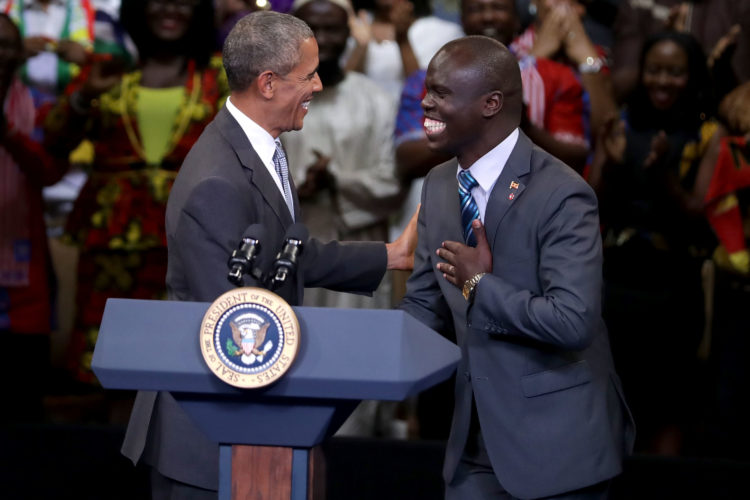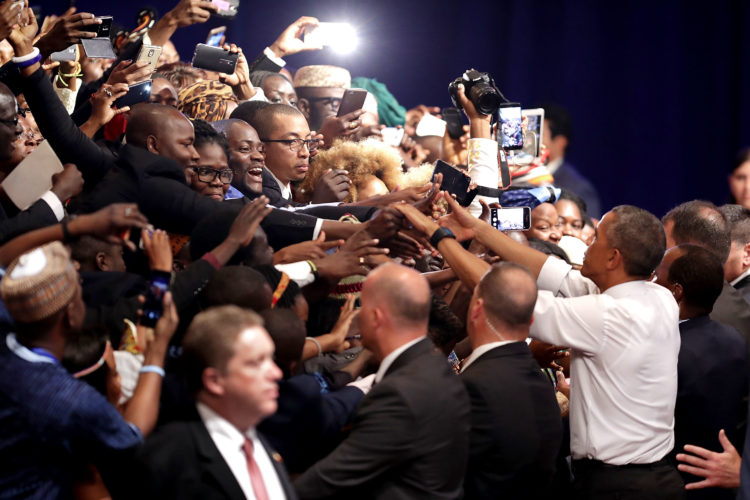As Barack Obama prepares to leave the White House on Friday, we felt it was an opportune time to reflect on a Pan-African youth network created and empowered by his administration, the Young African Leaders Initiative (YALI).
For the past three years, I have been involved with many promising talents (so-called YALIs) in the 250,000 member YALI network. I have also been a mentor and juror—from Washington, DC to Nairobi via Accra and Johannesburg—in the Mandela Washington Fellowship, YALI’s flagship programme, which brings up to 1,000 African civic, business and community leaders aged 25–35 for six weeks of academic coursework, leadership training and networking at US universities.
The 25-year-old tech entrepreneur Sam Kodo told me that he didn’t want to wash his hand for one month after shaking Obama’s hand.
Intensive and rewarding, the Mandela Washington Fellowship has enabled thousands of young Africans to discover the best of America and explore transcontinental learning opportunities, while encouraging them to take on action projects that can be implemented in their communities back home.

The icing on the cake, for many of the Mandela Washington Fellows, has been the visit to the White House, where they were personally greeted by Barack Obama. One of my Togolese mentees, the 25-year-old tech entrepreneur Sam Kodo told me that he didn’t want to wash his hand for one month after shaking Obama’s hand.
It was a privilege to sit in the front row in the full glare of the president.
Alfred Godwin Adjabeng, the Ghanaian executive director of the Reach Out to Future Leaders Movement is another Mandela Washington Fellow I’ve been mentoring for the past year. ‘I attended a town-hall meeting with President Obama,’ he says. ‘It was a privilege to sit in the front row in the full glare of the president. He spoke to my spirit and he made my work in Ghana count. Obama is an embodiment of new hope for African millennials.’
Somehow, despite the differences in cultural affinities, YALI organisers manage to shape cohesive groups by encouraging collaborative learning and individual growth. I often get involved in the YALI leadership seminars, and what I’ve found is a real openness to new ideas and a series of constructive debates on all kinds of topics. Social interaction and the right calibration in group dynamics have allowed for careful deliberation around new solutions to some of the issues facing African societies.
Fellow @immanuelhango
from #Namibia is producing chlorine using solar energy to help fight cholera w help from his mentor @philanthropysam ! pic.twitter.com/Y6m1aas6nu— MandelaWshFellowship (@WashFellowship) January 13, 2017
I met Amina Shaaban in Nairobi in June 2016, less than a year after she returned from her Mandela Washington Fellowship. A budding eco-entrepreneur in the Tanzanian recycling industry, she parlayed her Green Bandits startup idea all the way to a winning pitch at an East Africa YALI competition in which I was a juror.
He has a way of making you feel like you’ve known him forever, like you matter and you are, indeed, important.
‘Meeting Obama was surreal and exhilarating,’ she says, ‘because I had never imagined myself being in the same room as such a charismatic leader. When he entered the room and started speaking, it was as if I was transported to another universe. He has a way of making you feel like you’ve known him forever, like you matter and you are, indeed, important. I left that room feeling inspired and at peace with myself, knowing that as a young African woman, I could conquer the world. To this date, during my lows, I go back to that moment in time and remind myself how I felt and I become unstoppable.’

It’s been uplifting to witness the impact of Obama’s wisdom and charisma on so many YALIs’ outlook. Furthermore, the inspiration has led to on-the-ground implementation, and I’ve seen how some YALIs have quietly found a way to advance their own national or regional values by applying new types of ingenuity to a host of African business challenges.
Because it’s all about learning and taking action, I am also an online instructor on the YALI Network Online Courses platform—a few of my videos can be seen here. In that capacity, I’ve been in touch with hundreds of young African students who wish to take free online courses in order to learn the basics of entrepreneurship. Others have reached out to me because they seek to build careers in foreign policy, international development, media or technology.
As the Obama era has come to an end, I have felt a new sense of urgency in the way the YALIs absorb the lessons and insights.
David Gilmour, the current US Ambassador to Togo, is one of the original State Department diplomats who took part in creating the original blueprint for YALI. When I first met him in Lomé in December 2015, we discussed the positive impact YALI has had on this new generation of young African leaders.
I asked him whether YALI was just another tool for the US to extend its soft power. He said that YALI was more than a tool. Rather, he sees YALI as a launch pad for those who really want to learn from others and get their projects off the ground.
President Obama's thoughts on the future of the YALI Network from the 2016 YALI Summit. pic.twitter.com/MOn59RFr6a
— YALI Network (@YALINetwork) November 9, 2016
Lately, as the Obama era has come to an end, I have felt a new sense of urgency in the way the YALIs absorb the lessons and insights. This urgency is best described by Amina: ‘The best part about YALI for me was the sudden realisation that there is great talent for innovation and leadership within Africa. I knew there was greatness in Africa but when I met a sample few in one room and heard their triumphant stories, I was blown away. YALI has reassured me that Africa’s future is in safe hands.
‘Young people in Africa are rewriting history and changing the narrative. They are forging networks and collaborations across the board.’
